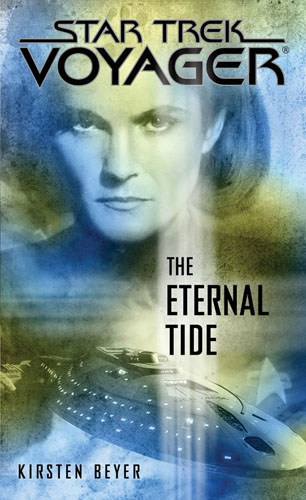by Matthew Rushing
WARNING: This review does contain spoilers.
Kirsten Beyer has a tall order in The Eternal Tide: How do you bring back a beloved character and not have it feel like a cheap stunt? To do this, she dips her fingers into the Star Trek mythos and pulls out something that has generally been the purview of Deep Space Nine. DS9 was the only series that seriously looked at the ideas of faith and destiny from a very religious sense. Sisko ended up being born of the Prophets and made for the specific purpose to save Bajor and lead them into a greater understanding of their faith. Beyer plunges Voyager deep into this milieu by weaving a Star Trek version of “Paradise Lost,” complete with forbidden fruit and omnipotent beings born to save. Beyer uses these elements because the ultimate questions have been wrestled with since humans could ask, and faith has been at the forefront of trying to find answers. Janeway herself, before she is returned, exists purely as her soul. She exists as the culmination of everything she was, is, and could be and this what she thinks:
“Faith.
Her soul.
They have always been there, underpinning what she believed were more useful to her: reason and passion. But, however briefly, Kathryn had touched something infinitely deeper. That short exposure had left her adrift but more firmly anchored to herself.
She had never shared with anyone the absolute devastation she had felt when a scientific explanation had been discovered to explain the ‘miracle.’ Had she spent more time in the company of her soul prior to this experience, the would not have been as quick to return to business as usual. Kathryn did not need to locate her soul within her. This ineffable thing was now the sum total of her reality”
By anchoring the return of Janeway in such epic and spiritual circumstances, Beyer has allowed her return to be greater than a stunt. She has fulfilled the very mission of Star Trek: seeking out new life and better understanding the cosmos. It is not just the science that is important to human understanding, but the metaphysical as well. Beyer does not shy away from this, and it makes the story all the more powerful.
Destiny plays a large part in The Eternal Tide. Janeway’s actions, along with the actions of Admiral Janeway, led to the ultimate destruction of the Borg. It may have come at the cost of billions, but the chain of events all led to the salvation of the universe instead of its enslavement. It seems that the left hand of destiny is not only with the Klingons, but working for the protection of the universe. The eternal tide has pulled all of these people together for such a time as this.
Even Janeway’s death has been used by destiny. Had she been alive, she would have fought against having Voyager return to the Delta Quadrant. Yet because of her death, Voyager and the fleet are in the Delta Quadrant with Afsarah Eden, one of the only people who can solve the galactic issue at hand. Eden has been given to this universe to bring the balance that had been corrupted many millennia ago by a race called the Anschlasom.
Some callbacks from the Voyager TV series have huge ramifications for the multiverse. In “The Q and the Grey,” Janeway helps the Q create life in the form of Junior. Q and Q create a child to save the continuum in that episode. In the end, Junior not only saves the continuum but the entire multiverse. He and Eden have both been created so that at the right time they can bring balance back to the multiverse. At one point in the book, Junior even quotes Christ, adding to the themes of faith and destiny in a more direct way.
Janeway needed to be resurrected at the last moment so that she could help Q and Q see that Junior had to sacrifice himself. She is the only person close enough to the situation who can truly speak to them in a way that they can understand. Just like Harry Potter, it was Junior’s destiny and his choice, and no one had the right to take that away from him. Because of Janeway’s experience in death and seeing how it has all worked together, she is able to encourage the Q to have faith — faith that the multiverse and whatever is behind it will work things out for the best. Nancy Conlon says it best at the end of the book: “There’s nowhere to run. Life has its share of truly awful days. It’s what you do with the rest of them that makes the difference.”
Another major theme portrayed strongly in the book is the idea of community and family and its importance in our lives. Tom and B’Elanna struggle with the issues of raising a child on a starship and the dangers that are involved; in the end, they decide that it is more important for the family to stay together. Nancy Conlon, who reaches her breaking point and is ready to go back to the Alpha Quadrant and hide behind a desk job, hopes that her issues will disappear as well. Harry helps her see that it is not by sequestering ourselves that we heal and move forward, it is in the light of community that we flourish. Though there are more examples, the strongest one is that the book constantly reminds us that Voyager is a family. Eden remarks to herself in the first staff meeting since Janeway’s return that the electricity in the air is because the family is all but complete, and together they can do anything.
Beyer deserves praise for the way she fits all these themes together. On top of that, this is one of the finest examples of using temporal mechanics I have ever seen in Star Trek. The more one thinks about the storyline Beyer has been laying out, the more it comes together. She has taken pieces from the series, the past books and the relaunch series to build something worth the potential Voyager started with in 1993. The truth with which she writes the characters cannot be denied. Especially in the small moments, each character shines as an extension of the growth that happened so haphazardly in the series, but has flourished under the attentive leadership of Voyager’s new captain, Kirsten Beyer. This is a warp ten book (on a warp scale from 1 to 9.99).
“Humanity is a stubborn thing, Kathryn Janeway. It hopes, even when all hope is gone” - Afsarah Eden

